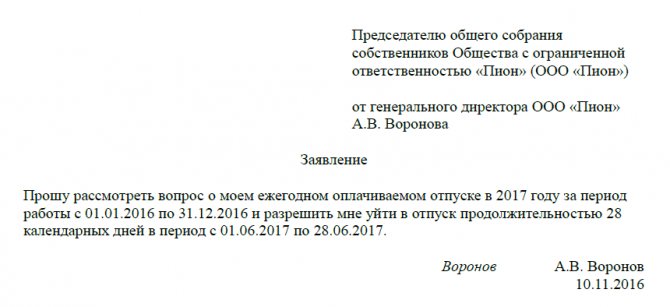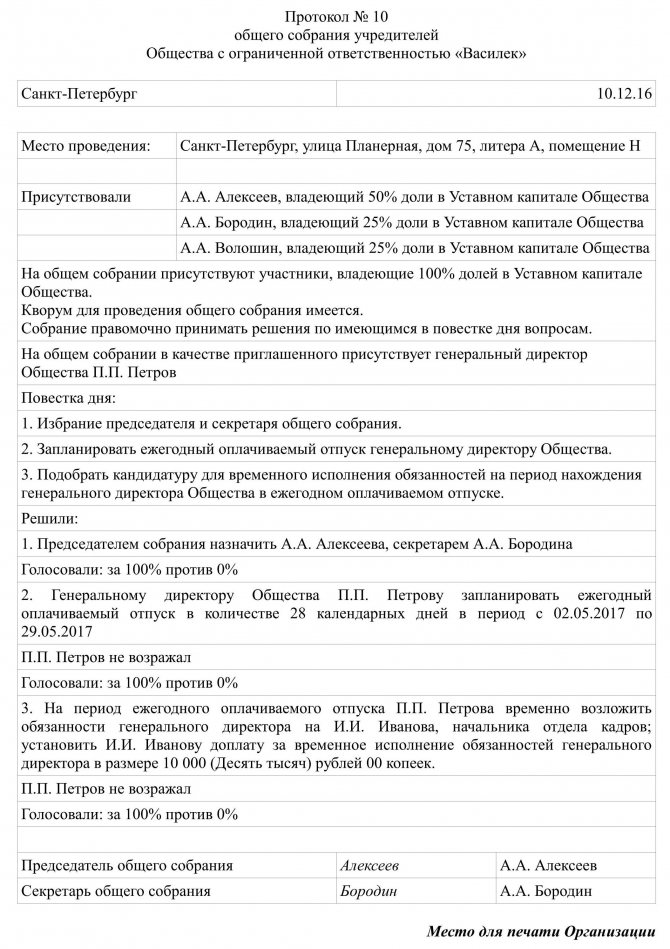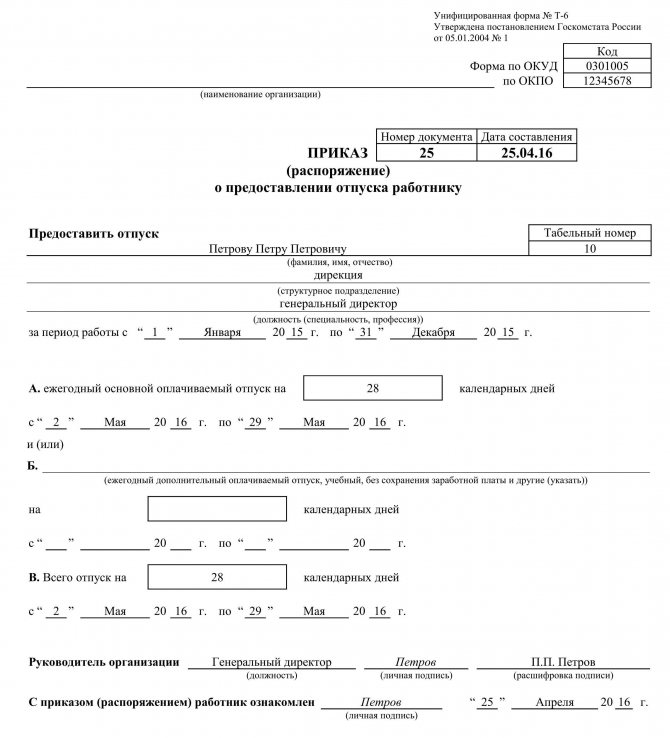Disputes around the concepts of AI and ACT and their use in labor relations have not subsided for many years. One of the reasons for the emergence of questions lies in the legislative recognition of the position of “acting” for civil servants, because we, regularly reading documents, see mention there of the position of an official as “acting”, for example, a minister or head of the Federal Tax Service of Russia. However, labor legislation or the job classification do not provide for such rates.
Until recently, specialists from the Department of Remuneration, Labor Relations and Social Partnership of the Ministry of Labor and Social Protection (separated from the Ministry of Health and Social Development by Decree of the President of the Russian Federation of May 21, 2012 No. 636) admitted that, firstly, not all phenomena arising in the field of labor relations , clear definitions are given in the Labor Code. And many of the concepts that are spelled out often cause ambiguous interpretation. And, secondly, there is some fragmentation of norms regulating the same phenomenon. And, thirdly, not all legislative norms of the Labor Code can be easily implemented, since not all have a prescribed implementation mechanism.
These words about difficulties fully apply to our dispute about IO and ACIO.
On a note
Throughout the Labor Code, mention of the performance of duties of a temporarily absent employee without release from work is contained only in Article 60.2 of the Labor Code, and Article 151 declares payment for such work.
On the one hand, according to Article 57 of the Labor Code of the Russian Federation, an essential condition of an employment contract is the indication of the labor function, that is, a position in accordance with the staffing table, profession or specialty with an indication of qualifications. At the same time, as we understand, it will not be possible to find the name of the educational institution in any staffing table or qualification directory.
Throughout the Labor Code, mention of the performance of duties of a temporarily absent employee without release from work is contained only in Article 60.2 of the Labor Code, and Article 151 declares payment for such work.
At the same time, in life it often turns out that there is a position, but for some reason there is no specialist for it. You can plug the “personnel hole” with the help of your own employees or “Varangians” from the outside. From the point of view of lawyers, temporary work is a form of temporary assignment of duties to another employee, with separation or combination with the performance of one’s own labor functions. However, monetary reward is not always guaranteed. After the specialist leaves, the workaholic returns to his previous place. And IE is a form of work in which an employee performs duties until a new person is appointed to a vacant position.
Vrio: decoding of the acronym
The abbreviation interim stands for temporarily performing (acting) duties. It is an acronym (a type of abbreviation), which is formed from the first letters of the phrase. Vrio retains the signs of initialization and at the same time belongs to the group of abbreviations designated as independent words. In spelling dictionaries of the Russian language, vrio is presented as an indeclinable noun of masculine and feminine gender.
The abbreviation for “interim” is often used in business speech.
And about. director (chief)
In office work, the phrase “performing (performing) duties” is often replaced by the abbreviation and. o., which is an absolutely acceptable norm, for example, and. O. General Director
The spelling dictionary of the Russian language presents such an abbreviation as an indeclinable unit of masculine and feminine gender. Incidents in official documents happen depending on how you spell io, IO or i. O. director.
Office work: everything about and. O. and acting
When one of the officials goes on vacation or sick leave, and the wording “temporarily acting” appears in the company’s documentation, the question of the correctness of the reduction becomes relevant. Then doubts arise: write acting or acting. So, are these concepts identical and interchangeable and, if not, what is the fundamental difference?
When to use abbreviations
In office work, it is a generally accepted norm to use the above-mentioned abbreviations when assigning the responsibilities of one manager to another. In legislation there is no clear boundary between these phrases, but from a linguistic point of view they have different semantic meanings, and therefore are used in clearly defined cases. There are also grammatical rules, how to write correctly, etc. O. and acting in documents.
Based on practice, it is obvious that abbreviations from “temporarily performing (acting) duties” are used when an employee of an organization is assigned the functions of an absent employee for a certain period. This may be the vacation time of the immediate supervisor, his sick leave and other cases when a person, due to some circumstances, cannot fulfill his official duties, and for this period they are usually assigned to his deputy.

A record of appointment as a temporary worker is not made in the employee’s work book. But to prepare internal documentation, you need to know how to spell this acronym correctly.
Abbreviation and. O. used in cases where we are talking about a vacant position. That is, when, according to the staffing table, there is a vacancy, and these job responsibilities are assigned to one of the employees until a suitable candidate is found. Moreover, this is done by combining positions. Also in cases where a person begins to perform the duties of an elective position before a meeting of the authorized body. This could be a general meeting, council or board.
How to write correctly
Let's look at specific examples of the use of and. O., Acting Director, let’s analyze how to write and abbreviate correctly.
Abbreviation and. O. CEO in most cases there is no difficulty in how to write correctly. In Russian, the generally accepted abbreviation denoting the acting (acting) manager is written with lowercase letters, after which dots must be placed. The first letter is capitalized only at the beginning of a sentence.
For example:
- In conclusion and... O. director (chief) emphasized the importance of the proposed project.
- And about. the boss arrived on an official visit.
The phrase “temporarily performing (acting) duties” is usually abbreviated as interim. The acronym Acting CEO in the backroom office has more spelling variations, causing confusion, as can be guessed by the question frequently asked on forums about how to spell it correctly.
It is unacceptable to write Acting Chief, Acting Director, Acting. and about. General Director In Russian spelling, there is only one correct and correct option - vrio. Moreover, the acronym is written with a lowercase letter, except when a sentence begins with it.
For example:
- The acting CEO approved the company's innovative development project for 2021.
- The acting head of the HR department reported on innovations in labor legislation.
In official documents, abbreviations and. O. and acting are written exclusively before the person’s position.
svoedelo-kak.ru
What does the concept of “interim” and “io” include?
Io and vrio are abbreviations.
The first stands for “acting”, and the second stands for “temporary”. An acting director is appointed when the position of manager is vacant and a search for a candidate for this vacancy is underway. Another option for assigning an io is a type of probation. This is done in the case when the position of a manager is elective, and one of the candidates for the position is given the opportunity to work in this capacity.
The situation with the interim is completely different. An interim manager is appointed if the manager goes on vacation, goes on a long business trip, is ill, or for some other reason is unable to perform his duties. In this case, the position of the manager is not vacated. This is the key point.
Case from practice
In what cases does it become necessary to temporarily act as CEO?
The answer was prepared jointly with the editors of System Personnel
Answered by Ivan Shklovets, Deputy Head of the Federal Service for Labor and Employment.
Temporary performance of the duties of the head of an organization is required in cases where he is absent for some reason (sick, on a business trip, vacation, etc.) and the organization’s charter does not stipulate that...
The full version of the answer is available after free registration
Temporarily performing the duties of a manager will be additional work for one of the organization's employees.
This requires the official consent of this employee. Typically, the form of such consent is an order for the appointment of an acting employee, in which the acting employee leaves his signature.
The Labor Code of the Russian Federation regulates the length of working time, which is allotted for an employee to perform managerial duties. It should not go beyond his working hours.
An employee performing managerial duties receives a salary for his main job and for his work as a manager of the company.
Vrio: decoding of the acronym
The abbreviation interim stands for temporarily performing (acting) duties. It is an acronym (a type of abbreviation), which is formed from the first letters of the phrase. Vrio retains the signs of initialization and at the same time belongs to the group of abbreviations designated as independent words. In spelling dictionaries of the Russian language, vrio is presented as an indeclinable noun of masculine and feminine gender.
The abbreviation for “interim” is often used in business speech.
And about. director (chief)
In office work, the phrase “performing (performing) duties” is often replaced by the abbreviation and. o., which is an absolutely acceptable norm, for example, and. O. General Director
The spelling dictionary of the Russian language presents such an abbreviation as an indeclinable unit of masculine and feminine gender. Incidents in official documents happen depending on how you spell io, IO or i. O. director.
Office work: everything about and. O. and acting
When one of the officials goes on vacation or sick leave, and the wording “temporarily acting” appears in the company’s documentation, the question of the correctness of the reduction becomes relevant. Then doubts arise: write acting or acting. So, are these concepts identical and interchangeable and, if not, what is the fundamental difference?
When to use abbreviations
In office work, it is a generally accepted norm to use the above-mentioned abbreviations when assigning the responsibilities of one manager to another. In legislation there is no clear boundary between these phrases, but from a linguistic point of view they have different semantic meanings, and therefore are used in clearly defined cases. There are also grammatical rules, how to write correctly, etc. O. and acting in documents.
Based on practice, it is obvious that abbreviations from “temporarily performing (acting) duties” are used when an employee of an organization is assigned the functions of an absent employee for a certain period. This may be the vacation time of the immediate supervisor, his sick leave and other cases when a person, due to some circumstances, cannot fulfill his official duties, and for this period they are usually assigned to his deputy.
A record of appointment as a temporary worker is not made in the employee’s work book. But to prepare internal documentation, you need to know how to spell this acronym correctly.
Abbreviation and. O. used in cases where we are talking about a vacant position. That is, when, according to the staffing table, there is a vacancy, and these job responsibilities are assigned to one of the employees until a suitable candidate is found. Moreover, this is done by combining positions. Also in cases where a person begins to perform the duties of an elective position before a meeting of the authorized body. This could be a general meeting, council or board.
How to write correctly
Let's look at specific examples of the use of and. O., Acting Director, let’s analyze how to write and abbreviate correctly.
Abbreviation and. O. CEO in most cases there is no difficulty in how to write correctly. In Russian, the generally accepted abbreviation denoting the acting (acting) manager is written with lowercase letters, after which dots must be placed. The first letter is capitalized only at the beginning of a sentence.
For example:
- In conclusion and... O. director (chief) emphasized the importance of the proposed project.
- And about. the boss arrived on an official visit.
The phrase “temporarily performing (acting) duties” is usually abbreviated as interim. The acronym Acting CEO in the backroom office has more spelling variations, causing confusion, as can be guessed by the question frequently asked on forums about how to spell it correctly.
It is unacceptable to write Acting Chief, Acting Director, Acting. and about. General Director In Russian spelling, there is only one correct and correct option - vrio. Moreover, the acronym is written with a lowercase letter, except when a sentence begins with it.
For example:
- The acting CEO approved the company's innovative development project for 2021.
- The acting head of the HR department reported on innovations in labor legislation.
In official documents, abbreviations and. O. and acting are written exclusively before the person’s position.
svoedelo-kak.ru
What is the difference between vrio and io?
The difference between acting and io is spelled out in Art. 151 and art. 74 Labor Code of the Russian Federation.
The key difference between an interim and an io is the way they perform their assigned duties. An interim is an employee who replaces a manager, and an io is a person who fully performs management functions until a candidate for the position of manager is found.
Another difference between an acting director and an acting director is that an acting director can later take the place of a manager, but an acting director cannot.
What is the difference between vrio and io?
- Responsibilities. Io is an employee who is transferred to a new job. An interim is an employee who temporarily performs the duties of a manager, combining these functions with his main activity.
- Time frame. Io - holds the position of leader until a new one is found. It often happens that he himself becomes a leader. Acting - acts as a chief only for a certain period of time.
- Job opening. Io performs its functions at the moment when the vacancy of a manager is available. Acting - manages the company when the boss for some reason cannot do this.
The difference between acting and acting is not so great outwardly: in both cases, one of the employees performs the functions of a manager. However, the internal differences between these concepts are enormous.
Vrio: decoding of the acronym
The abbreviation interim stands for temporarily performing (acting) duties. It is an acronym (a type of abbreviation), which is formed from the first letters of the phrase. Vrio retains the signs of initialization and at the same time belongs to the group of abbreviations designated as independent words. In spelling dictionaries of the Russian language, vrio is presented as an indeclinable noun of masculine and feminine gender.
The abbreviation for “interim” is often used in business speech.
And about. director (chief)
In office work, the phrase “performing (performing) duties” is often replaced by the abbreviation and. o., which is an absolutely acceptable norm, for example, and. O. General Director
The spelling dictionary of the Russian language presents such an abbreviation as an indeclinable unit of masculine and feminine gender. Incidents in official documents happen depending on how you spell io, IO or i. O. director.
Office work: everything about and. O. and acting
When one of the officials goes on vacation or sick leave, and the wording “temporarily acting” appears in the company’s documentation, the question of the correctness of the reduction becomes relevant. Then doubts arise: write acting or acting. So, are these concepts identical and interchangeable and, if not, what is the fundamental difference?
When to use abbreviations
In office work, it is a generally accepted norm to use the above-mentioned abbreviations when assigning the responsibilities of one manager to another. In legislation there is no clear boundary between these phrases, but from a linguistic point of view they have different semantic meanings, and therefore are used in clearly defined cases. There are also grammatical rules, how to write correctly, etc. O. and acting in documents.
Based on practice, it is obvious that abbreviations from “temporarily performing (acting) duties” are used when an employee of an organization is assigned the functions of an absent employee for a certain period. This may be the vacation time of the immediate supervisor, his sick leave and other cases when a person, due to some circumstances, cannot fulfill his official duties, and for this period they are usually assigned to his deputy.
A record of appointment as a temporary worker is not made in the employee’s work book. But to prepare internal documentation, you need to know how to spell this acronym correctly.
Abbreviation and. O. used in cases where we are talking about a vacant position. That is, when, according to the staffing table, there is a vacancy, and these job responsibilities are assigned to one of the employees until a suitable candidate is found. Moreover, this is done by combining positions. Also in cases where a person begins to perform the duties of an elective position before a meeting of the authorized body. This could be a general meeting, council or board.
How to write correctly
Let's look at specific examples of the use of and. O., Acting Director, let’s analyze how to write and abbreviate correctly.
Abbreviation and. O. CEO in most cases there is no difficulty in how to write correctly. In Russian, the generally accepted abbreviation denoting the acting (acting) manager is written with lowercase letters, after which dots must be placed. The first letter is capitalized only at the beginning of a sentence.
For example:
- In conclusion and... O. director (chief) emphasized the importance of the proposed project.
- And about. the boss arrived on an official visit.
The phrase “temporarily performing (acting) duties” is usually abbreviated as interim. The acronym Acting CEO in the backroom office has more spelling variations, causing confusion, as can be guessed by the question frequently asked on forums about how to spell it correctly.
It is unacceptable to write Acting Chief, Acting Director, Acting. and about. General Director In Russian spelling, there is only one correct and correct option - vrio. Moreover, the acronym is written with a lowercase letter, except when a sentence begins with it.
For example:
- The acting CEO approved the company's innovative development project for 2021.
- The acting head of the HR department reported on innovations in labor legislation.
In official documents, abbreviations and. O. and acting are written exclusively before the person’s position.
svoedelo-kak.ru
General concepts
Director is a fairly common position; its presence is mandatory in many cases. This is usually due to the structure of the enterprise. It is important to familiarize yourself in advance with the requirements in the legislation - which determine the need to have one.
But it often happens that a particular citizen is simply not able to cope with all the functions on his own. In this case, the solution is to appoint an acting or deputy.
Dear readers! The article talks about typical ways to resolve legal issues, but each case is individual. If you want to find out how to solve your particular problem , contact a consultant:
+7 (499) 938-81-90 (Moscow)
+7 (812) 467-32-77 (Saint Petersburg)
8 (800) 301-79-36 (Regions)
APPLICATIONS AND CALLS ARE ACCEPTED 24/7 and 7 days a week.
It's fast and FREE !
It should be noted that such a position must be added to the staff. This implies the conclusion of an employment contract. Drawing up some other documents. You need to familiarize yourself with all of them in advance.
Separately, it is necessary to note the order of execution of documents, their format and all the entries that must be made. It is not allowed to make mistakes when preparing documentation. Because this may result in a serious fine.
What it is
Executive director is a position that implies financial and other responsibility. That is why it is important to familiarize yourself in advance with all the intricacies and features of the work of such an employee. Moreover, for the functioning of the enterprise, the presence of one is strictly necessary. It should be noted that the absence of the director will not allow stamps and signatures on important documents.
Photo: Spelling
As a result, the legal entity simply will not be able to function normally. The way out of this situation will be the appointment of an acting person. The abbreviation I.O. is also used to designate the position.
There are several important points to note:
| Indicators | Description |
| The appointment of an employee is carried out in accordance with the Labor Code of the Russian Federation | an agreement is drawn up and other documents are prepared without fail |
| It is not allowed to appoint an acting person to a position that is vacant | and it is necessary to hire a new employee |
In addition to the nuances outlined above, there are a number of others. It is also best to familiarize yourself with all of them in advance. This is the only way to prevent standard mistakes. It is important to note that the design algorithm for I.O. standard. It will be necessary to draw up a special order document. An employment contract must also be prepared.
What is regulated
The legislation directly addresses the issue of fulfillment of duties. You need to familiarize yourself with all the subtleties and nuances of the process in advance. The main NAP, which determines all the main points, is precisely Chapter No. 10 of the Labor Code of the Russian Federation. Part 3, section 1 covers the issue of documenting the process of hiring an acting official.
Sections you need to study first:
| Article | Description |
| Article No. 60.2 | how to combine professions and positions |
| Article No. 60.1 | entry into force of labor legislation |
In addition to the main subtleties and nuances in the Labor Code of the Russian Federation, it will be necessary to deal with all other NAPs. This will avoid problems. Most often, difficulties arise due to banal legal illiteracy.
Knowledge of the law allows you to exercise control over compliance with your own rights. And demand their implementation. It is also important to note that performing duties for a specific employee imposes certain obligations.
It is also important to understand all of them. The concept of an employment contract is also discussed in detail. It is defined in Article No. 56 of the Labor Code of the Russian Federation. The employer should familiarize itself with all provisions. For example, agency labor is not allowed.
This issue is addressed in Article No. 56.1 of the Labor Code of the Russian Federation. The procedure for drawing up an employment contract, as well as its contents, is reflected in Article No. 57 of the Labor Code of the Russian Federation. Separately, you will need to familiarize yourself with the validity period. It is defined in Article No. 58 of the Labor Code of the Russian Federation.
Employment contract upon appointment of I.O. usually standard, it includes all default items. The only difference, as a rule, is the basis for termination of such an agreement. This usually occurs when a full-time employee goes to work.
Also, an employment contract can be fixed-term. When a certain period of validity is determined. It is important to sort out all the main nuances in advance. If an employee believes that their rights are being violated in any way, they should seek legal advice. Only in this way will it be possible to minimize all difficulties and problematic issues.
The last resort is to go to court. But it should be noted that such events require a fairly large amount of time, as well as some funds. It is best to work out this point in advance. Today, labor disputes are one of the most complex subjects of law.
Replacement required
The head of the company may be absent from his workplace for one reason or another. However, the director is a key figure in the company and in his absence someone must perform his duties. In order for the orders of the deputy to be legitimate, an order is issued to the acting director. It is clear that a replacement must be formalized if the company’s charter does not stipulate that the functions of the organization’s general director are performed by several employees (clause 3 of article 65.3 of the Civil Code of the Russian Federation).
In general, the responsibilities of the general director, which is quite logical, are assigned to his deputy. However, if the head of the company does not have a deputy whose functionality includes temporarily performing the functions of a manager, then the duties of the general director are delegated to any other employee of the company.
They also do this by issuing an order on the appointment of an interim director (clause 1 of the Procedure, approved by clarification dated December 29, 1965 of the USSR State Committee for Labor No. 30 and the Secretariat of the All-Union Central Council of Trade Unions No. 39).
We've sorted out the order, now let's talk about the application addressed to the acting one.
The procedure in which the temporary replacement of the head of the organization will take place can be provided for in the company’s statutory documents. For example, in the event of a long absence of a director, it is possible to provide an algorithm for appointing a new head of the company to the position (Clause 2, Article 12 of Federal Law No. 14-FZ dated 02/08/1998, Article 11 of Federal Law No. 208-FZ dated 12/26/1995).
Acting in a joint stock company
26.10.2010
Estimated reading time: 7 minutes.
Yulia Borozdna 549
Situations in which the appointment of an interim general director (“ACTI”) is required may be different: the general director may go on a long business trip, get sick, go to study for an MBA program, etc. Also, the previous general director may resign at the initiative of the employer or at one’s own request, however, the company may not have a suitable candidate for this position and, accordingly, before hiring a “permanent” director, it is required to hire a “temporary” one. The issue of appointing an acting acting executive is highly controversial in the field of both labor and civil law. In this article we will look at the procedure for appointing and the powers of an acting acting executive in the situation described in the Law “On Joint Stock Companies” (“JSC Law”), and in particular we will pay attention to some controversial issues that may arise in practice.
In accordance with paragraph. 4 hours 4 tbsp. 69 of the Law on JSC, in the case when the appointment of a general director is carried out by a general meeting of shareholders and the general director cannot fulfill his duties, then the board of directors of the company has the right to decide on the formation of a temporary sole executive body (appointment of an interim executive body) and on holding an extraordinary general meeting of shareholders to decide the issue of early termination of the powers of the General Director and the appointment of a new director. The main meaning of this rule is that until the meeting of shareholders at which a new general director is elected, the company should not be left without operational management, since convening and organizing an extraordinary general meeting may require several weeks. Let us consider this provision of the law from the point of view of labor and corporate law.
The application of this article begins from the moment when the general director is unable to perform his duties. The criteria under which circumstances it is impossible for the general director to perform his duties have not been defined. Existing judicial practice proceeds from the fact that the need to appoint an interim agent must be justified and, in the event of a dispute, must be supported by evidence. In particular, the proactive actions of the general director himself in appointing an acting director by his order may be evidence of the opposite, namely the absence of the need to appoint an acting acting director by the board of directors [1].
An example of the inability of the general director to fulfill his duties is the imposition of an administrative penalty on him in the form of disqualification. However, since the disqualification of the general director is expressed in the impossibility for him to hold positions only in the executive management body of the company (Part 1 of Article 3.11 of the Administrative Code), then with his (the director’s) consent the General Director can be transferred to another vacant position in the company (Part 2 p. 83 of the Labor Code of the Russian Federation). So, if an acting deputy general director is appointed, then the director himself can move to the position of deputy. Such is the “castling”! What should members of the board of directors do if, after disqualifying the general director, they do not want to leave him in the company (for example, the general director is found guilty of violating the procedure for disclosing information, which violates the rights of shareholders), and the director, on the contrary, not only agrees to the transfer, but does he want it himself? The advantage in this confrontation is on the side of the general director, since it is he, as the person who approves the staff until the appointment of a new general director (paragraph 3, part 2, article 69 of the JSC Law), who can influence, for example, the availability of corresponding vacant positions in the staff schedule. In this case, it will not be easy to prove the fact that the director’s actions caused losses to the company, and it will not be easy to fire him in a new position. The suspension of the powers of the general director by the board of directors provided for by the Law on JSC is possible only if such power of the board of directors is expressly provided for in the charter (paragraph 3, part 4, article 69 of the Law on JSC), however, such suspension may also not prevent the director from taking actions beneficial to him .
When deciding on the appointment of an acting acting director, the board of directors can select a suitable candidate both from among the company’s employees and from among persons who are not employees of the company.
If, for example, a candidate for the position of acting acting director is not an employee of the company, then it would seem that the procedure for his appointment seems quite simple. However, if you look into the existing regulatory framework, you will discover a number of pitfalls.
Thus, to the extent that does not contradict Russian legislation, the Explanation of the State Committee for Labor of the USSR No. 30 and the All-Union Central Council of Trade Unions No. 39 dated December 29, 1965 (with subsequent amendments and additions) “On the procedure for paying temporary substitution” (“Explanation”) is still applied [2 ]. In accordance with paragraph. 1 clause 2 of this Clarification, as a general rule, the appointment of an employee as acting for a vacant position is not allowed. Thus, if by the time the interim CEO is appointed, the employment contract with the general director has already been terminated (for example, in the event of the director’s death), then the position of the general director will be vacant and this restriction may apply. But then it turns out that it is generally impossible to appoint an interim agent in this situation?
In accordance with the same paragraph. 1 clause 2 of the said Explanation, appointment as acting for a vacant position is possible, but only for a position to which the appointment is made by a higher management body. Thus, after the first reading of this provision, we can conclude that the situation with the general director is just that exceptional case, since the superior body in relation to the general director is the board of directors. However, there are two interpretations of this provision of the Clarification.
In accordance with a restrictive interpretation, the specified exception does not apply to the situation with the appointment of an acting acting director by the board of directors, since a comprehensive reading of paragraph. 1 and 2, paragraph 2 of the Explanation allows us to conclude that the position of general director does not fall under this exception. So, further in the specified paragraph 2 of the Explanation it is said that the acting acting director is accepted for the position by the head of the organization (who is the general director), and that the documents for the appointment of the acting acting director are also provided to the higher body by the head of the organization.
In accordance with a broad interpretation that allows for the use of analogy, temporary substitution for a vacant position of the head of an organization is allowed, but cannot last more than 1 month, since the Explanation states that “the head of an enterprise, institution, organization is obliged no later than one month from the date of hiring the worker work, submit documents to a higher management body for his appointment to the position. This body must consider the issue within a month from the date of receipt of the documents and inform the manager about the results.” Thus, an analogy is drawn with the board of directors, which convenes a general meeting of shareholders, which, in turn, decides to appoint a general director.
It seems that the most rational position in this case would be to refer to the fact that since the JSC Law allows for the existence of an interim joint-stock company in a situation where the general director has already been dismissed, the restrictions provided for in the Explanation should not apply.
In addition, this Explanation establishes that if an employee who was not hired from among the employees of this organization is not approved for a position on a permanent basis, he must be offered another job, taking into account his qualifications and experience; in this case, dismissal is allowed only in the absence of corresponding work or refusal of the offered work on the grounds provided for by law (an agreement of the parties is given as an example of such a basis). This provision of the Clarification can also be interpreted both broadly (applicable to the acting general director) and restrictively (not applicable to the acting general director). However, if, for example, in the course of a dispute between a company and an employee (appointed as an interim executive and wishing to continue working in the company, but either does not agree with the proposed vacancies or did not receive any offers due to the lack of vacancies), the court adheres to a broad interpretation, then a problem will arise with grounds for dismissal of such an employee if he does not agree either to the agreement of the parties or to dismissal of his own free will. The Labor Code of the Russian Federation contains an exhaustive list of grounds for dismissal, and in all “stalemate” situations there is an appropriate basis (for example, refusal to continue work due to a change in the terms of the employment contract (clause 7, part 1, article 77 of the Labor Code of the Russian Federation), refusal to transfer in connection with a medical report (clause 8, part 1, article 77 of the Labor Code of the Russian Federation), etc.)). However, such grounds for termination of an employment contract as the impossibility of providing work to a person performing duties in a vacant position and not approved in this position, due to his refusal of the offered vacancies or the lack of corresponding work, are not provided for by the Labor Code of the Russian Federation. It seems that the court will either refuse to apply the relevant clause of the Explanation on a formal basis, or will facilitate the parties to enter into a settlement agreement.
In accordance with paragraph. 6 hours 4 tbsp. 69 of the Law on JSC VRIO manages the current activities of the company within the competence of the general director of the company, unless the competence of the VRIO is limited by the charter of the company. Thus, if the competence of the acting acting director is not limited by the charter, then he enjoys the same powers as the general director. Additional rights and obligations of an acting executive may be specified in the employment contract with him.
* * * * *
Thus, this article examined only some of the problems that may arise in practice if it is necessary to appoint an AO in a joint-stock company. Accordingly, in order to avoid these risks, companies are advised either not to resort to the institution of AO, or to prepare a good documentary “foundation” for formalizing the relevant relations (including indicating the relevant provisions on AO in the company’s charter, a thorough documentary justification for the inability of the general director to fulfill his duties, etc.) .
[1] See, for example, Resolution of the Thirteenth Arbitration Court of Appeal dated September 25, 2007 No. A26-1497/2007.
[2] See, for example, the decision of the Moscow Arbitration Court dated January 26, 2007 in case No. A40-75920/06-117-484.
The issue is not resolved
A situation may arise at an enterprise when the powers of the director are transferred to another person. How to write a statement to an acting official? Let us say right away that the current legislation does not contain a clear answer to this question.
In addition to the order, a power of attorney must be issued for the deputy. Its task is to confirm the authority of the deputy. Therefore, the head of the organization must sign the power of attorney (clause 4 of Article 185.1 of the Civil Code of the Russian Federation). The maximum validity period of such a power of attorney is 1 year from the date of issue (clause 1 of Article 186 of the Civil Code of the Russian Federation).
In our opinion, the application to the acting director should be written to the absent general director. In any case, despite his absence, he remains the head of the organization. In turn, the person performing his functions will consider the received application and make a decision on it within the framework of the powers assigned to him.
It is also not forbidden to write a leave application to the acting official. However, it is unlawful to name in the application the official replacing the director as “acting,” “acting,” or “acting.” After all, the name of the position of the replacement person did not change from the assignment of the functions of the general director in the staffing table. Therefore, when writing an application, you should indicate the position of the employee who is entrusted with the functions of a manager. A sample header statement in this case will look like this:
Did you like the article? Share the link with your friends:
blogkadrovika.ru
Writing an address in documents
The correct spelling of addresses is enshrined in the Rules for the provision of postal services No. 221 of April 15, 2005. There is a special procedure for indicating all elements of the address; this was done for a reason, but to facilitate the work of post office employees. Therefore, when indicating an address, you first need to write the name of the organization or the surname of the addressee, then the name of the street indicating the house number, locality, region, region, republic, and at the very end - the postal code.
Who decides the issue of rest for the first person
An application for leave from the general director (sample below) is considered at the general meeting of the owners of the organization, since they are employers for the first person of the company.
Application for director's leave sample (2017)

Let’s make a reservation right away that all issues related to the activities of the company’s chief executive, including writing a leave application for the CEO, are directly related to the provisions enshrined in his employment contract and the organization’s Charter.
If the Charter contains information that the issue of granting leave to a director is decided at a general meeting of founders, the director will have to contact the general meeting of founders and discuss the issue of his leave at this meeting. Moreover, there the issue of candidacy of the person who will perform the functions of the chief during his absence will have to be resolved. The results of the meeting are documented in minutes, information from which serves as the basis for including relevant information in the schedule, and further, for issuing an order to grant leave to the manager.
Sample protocol

The order in this case is issued in free form, because it will be signed by the chairman of the general meeting, who is not the director of the organization.
Sample order in free form

If the company's charter provides that the general director himself has the right to decide when to go on vacation, he acts in the following order:
- Notifies the owners of the organization of his intention to go on vacation (the director does not write a vacation application to himself).
- Coordinates with the owners of the company the candidacy of a deputy during his absence.
- Enters information about your vacation into the vacation schedule.
Application for leave of director (sample) in the form of notification

Sample order in form T-6

How is temporary and io issued?
Let's now consider how to properly issue a temporary or io.
Registration of temporary
The registration procedure depends on how the labor functions of the absent employee will be performed.
Complete release from duties implies the need for temporary transfer to another position. This follows from Article 72.1 of the Labor Code. The performance by an employee of “other people’s” functions along with his own allows for two design options:
- Combination. Working during core working hours, expanding service areas and increasing the overall volume of work.
- Part-time job. Employment in free time from main work. This follows from articles 282-288 of the Labor Code. Work under a contract also falls into this category.
If the part-time option is chosen, then in this case you will have to conclude a new employment contract. It will indicate the fact of part-time work, as well as the length of working hours and the amount of compensation. Information about such work, at the request of the employee, is entered into his work book.
If the option of combining, expanding labor functions or transfer is chosen, then in this case it is necessary to conclude an additional agreement to the existing employment contract and in it provide a description of the new job, stipulate the duration of working hours and the amount of compensation.
As a rule, an order to transfer responsibilities during the absence of a manager is included in an order that justifies the fact of absence. For example, in an order for a manager’s leave, a separate line contains information about the employee who will temporarily perform the duties of a manager. Both interested parties must be familiar with the order.
If an employee will perform the duties of a financially responsible person, then a separate agreement on full financial responsibility must be concluded with him.
Io design
Create a position and... O. possible in several ways. Here are two main options:
- An order for an enterprise when a new vacancy does not open. This means that the leader appoints himself.
- Order after a meeting of directors or a general meeting. This situation is possible when there is a vacant position. In this case, the decision to appoint a candidate for the post of director must be made exactly one month in advance.
Conclusion
The main difference between an acting director and an acting leader is that an acting director performs the duties of an absent leader, while an acting director performs the duties of only a temporarily absent leader. The interim performs his duties part-time, and the io performs his duties as his main job. The difference in the functional potential of interim and io determines the difference in design: combination or full-time.
Similar articles:
- Siberian Institute of Business and Information
NOU VPO "SIBERIAN INSTITUTE OF BUSINESS AND INFORMATION TECHNOLOGY" (SIBIT)General information about the institute. www.sano.ruGreetings from the Rector Dear friends!… - Article 155 LC Article 155 LC RF. Payment for residential premises and utilities. Housing Code of the Russian Federation…
- New Year's gifts from the trade union A wonderful tradition - giving New Year's gifts at work for the children of employees - has taken root...
- Article 69 of the Housing Code of the Russian Federation Comments on Art. 69 of the Housing Code of the Russian Federation Article 69 of the Housing Code of the Russian Federation. Rights and obligations of the employer's family members...
Who can act as a director in his absence?
The duties of a manager during his absence can be performed by:
- A full-time deputy whose employment contract and job description contain provisions for the temporary performance of the duties of the chief in his absence.
- An employee of the organization in order to combine positions.
Remuneration in the first case is regulated by Explanations on the procedure for payment of temporary substitution dated December 29, 1965 No. 30/39. In the second case, according to Article 151 of the Labor Code of the Russian Federation, it is established by agreement of the parties. But in any case, no matter how a temporarily absent director is replaced, an additional payment for replacement must be established.
The legislation also provides for other ways to replace an absent director, such as a fixed-term employment contract (Article 59 of the Labor Code of the Russian Federation), part-time work (Article 60.1 of the Labor Code of the Russian Federation), temporary transfer to another job (Article 72.2 of the Labor Code of the Russian Federation), but in practice they are used , as a rule, when the first person of the organization is absent from work for a long period of time, but he retains his previous position (for example, parental leave).
In any case, when performing the duties of a director, regardless of the reasons for his absence, an order is issued, which is the formal basis for carrying out the relevant activities in the temporarily filled position.
Different terms
The terms of work of an acting temporary employee are established by the employer with the written consent of the employee (Part 3 of Article 60.2 of the Labor Code). That is, additional work can be done until the need disappears or the workaholic himself is “dragged away” by relatives to preserve his health.
However, for an acting temporary transfer, the transfer has a time limit: up to one year - in general, until the replacement employee returns to work - if the latter retains a position during his absence in accordance with the law.
In the latter option, some friction is possible, including legal claims. Since the period of absence of the required specialist should not disrupt the normal activities of the organization, the “personnel hole” is patched, and the return of the employee after several months, and possibly years, creates a personnel problem, the resolution of which requires not intelligence and ingenuity, but the manifestation of the wise foresight of the manager for uninterrupted and conflict-free work.
If a fixed-term contract was concluded with an employee for the duration of the duties of the absent employee, then it terminates with the departure of this specialist (Article 79 of the Labor Code). Moreover, this can happen either after three years, for example, at the end of parental leave, or on any day when a colleague decides to interrupt his absence.
How to place an order correctly
When issuing orders for the performance of duties, the question often arises: how to write correctly - temporarily acting (acting) or acting (io)?
There is a generally accepted rule: interim is used when replacing a temporarily absent employee whose position is retained, for example, due to temporary disability.
Io is used when an employee temporarily performs duties in a vacant position.
In principle, both options can be used; there is no fundamental difference, with the exception of government organizations, where these issues are outlined in the relevant instructions.
Comparison
The legal differentiation of these terms is laid down in Articles 74 and 151 of the Labor Code of the Russian Federation, and their provisions have been honed in practice. Thus, an acting acting director is appointed to a position with a release from the old one. The position he took is not vacant, so he will work until the main employee returns. The EO combines responsibilities with his main position. However, the position to which he is appointed remains vacant.

It is worth mentioning right away that the interpretation of the norms is formed by practice, and often VRIO and IO are used as synonyms. Additional payment is made in cases where the temporary position holder is not a full-time deputy of a person who cannot begin work duties. Official explanations do not in any way alleviate the severity of the problem, since they themselves are contradictory.
Transfer of powers during the performance of duties
Carrying out formal activities to replace an absent director entails the emergence of corresponding rights, duties and responsibilities for the replacement employee. But if an order within the company is sufficient to carry out legally significant actions, then for cooperation with third-party organizations a power of attorney may be required, for example, to represent interests in court.
The power of attorney must be executed on the organization's letterhead, contain information about the time and place of its writing, validity period, signature of the organization's first person and seal.
The power of attorney itself indicates the person to whom the power of attorney was issued, with full passport data, date of birth and place of registration. It also needs to formulate a list of specific powers available to the performer. In this case, general phrases should be avoided, all wording should be as specific as possible, avoid double interpretations, and the names of the institutions in which it is planned to represent interests should be written in full to avoid misunderstandings.
clubtk.ru
This is interesting:
- What kind of additional payment to the pension was there in August? An increase to the pension in August: permanent or one-time Today, when the ruble exchange rate is falling more and more, and food prices in Russia, unfortunately, are not inclined to decrease, any help from the state can become a noticeable help for this , […]
- Applications for employment labor code Application for employment (form and sample) Updated: March 3, 2021 Example of an application for employment Employment of an employee involves the preparation of many documents. Most of them are required to be drawn up in labor […]
- Young minors Psychological problems of minor parents Today, the psychological problems of minor parents are developing more and more. According to statistics, young minor parents abandon their child […]
- Derivative basic rules Find the derivative: algorithm and examples of solutions The operation of finding the derivative is called differentiation. As a result of solving problems of finding derivatives of the simplest (and not very simple) functions to determine the derivative […]
- Conductor resistance from Ohm's law Conductor resistance from Ohm's law Ohm experimentally established the law according to which the strength of the current flowing through a homogeneous (in the sense of the absence of external forces) metal conductor is proportional to the voltage drop V by […]
- Application for privatization permission Privatization of a land plot: sample application, registration procedure On 03/01/2015, a legislative act extending the so-called “dacha amnesty” came into force. Federal Law No. 171-FZ dated June 23, 2014 allowed citizens […]







